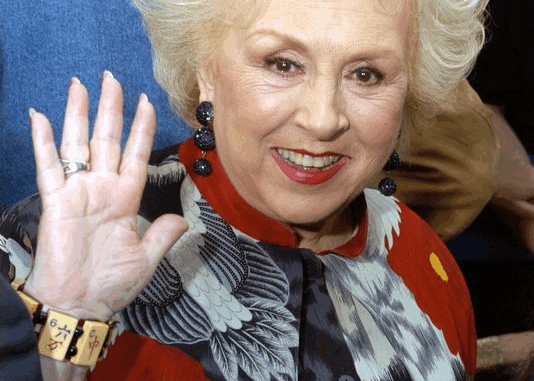
In the pantheon of television mothers, few have commanded the screen — and their families — like Doris Roberts. As Marie Barone, she redefined the sitcom matriarch: manipulative yet loving, passive-aggressive yet deeply invested in her children’s lives, and always — always — just a little too present.
But Doris Roberts was more than just Marie. With a career that spanned over six decades, she was a seasoned character actress, a five-time Emmy winner, a fierce advocate for the arts, and a woman whose off-screen legacy is just as compelling as her on-screen brilliance.
This is the full portrait of Doris Roberts — the actress, the activist, the legend.
Early Life: From Brooklyn Beginnings to Broadway Dreams
Doris Roberts was born Doris May Green on November 4, 1925, in St. Louis, Missouri, and raised in the Bronx by her mother, who worked tirelessly after her father left the family. Her stepfather, Chester Roberts, would eventually give her the last name that became synonymous with comedic royalty.
Roberts showed early talent for performance, enrolling at The Neighborhood Playhouse School of the Theatre in New York, where she studied under Sanford Meisner, one of the most respected acting teachers in America. She was part of the generation that took acting seriously — as a craft, a calling, and a lifelong pursuit.
Early Career: The Character Actress Who Could Do It All
Roberts began her screen career in the 1950s and quickly made a name for herself as a versatile, scene-stealing character actress. She appeared in countless television shows and films, playing everything from nosy neighbors to cynical secretaries to sweet grandmothers with a hidden bite.
Some of her early TV credits include:
-
The Naked City
-
The Mary Tyler Moore Show
-
Barney Miller
-
Soap
-
St. Elsewhere
In film, she appeared in acclaimed movies like:
-
The Taking of Pelham One Two Three (1974)
-
A New Leaf (1971), directed by Elaine May
-
National Lampoon’s Christmas Vacation (1989), playing the cranky but loveable Grandma Griswold
But it was in television where she truly flourished.
The 1980s: Earning Emmy Respect
Before Everybody Loves Raymond, Roberts had already made waves in the industry. From 1983 to 1987, she played Mildred Krebs on Remington Steele, alongside Pierce Brosnan. Her role as the tenacious secretary-turned-investigator earned her critical acclaim and an Emmy nomination.
She was beloved for her ability to balance pathos and punchlines — and her star continued to rise.
Everybody Loves Raymond: Marie Barone Enters the Room
In 1996, Roberts took on the role that would define the last chapter of her career: Marie Barone, Ray’s opinionated, overbearing, and hilariously intrusive mother.
Marie was the kind of woman who showed up uninvited, judged your cooking, “accidentally” undermined your parenting, and then insisted she was only trying to help — and Roberts played her with dazzling brilliance.
She wasn’t a villain; she was a force of nature.
Marie’s passive-aggressive jabs, melodramatic sighs, and endless meddling made her both infuriating and deeply lovable. Roberts said she based Marie on people she had known growing up in the Bronx — women who were strong, over-involved, and emotionally complex.
Her performance won her four Emmy Awards for Outstanding Supporting Actress in a Comedy Series (1999, 2001, 2002, 2003), and she was nominated every year the show aired — an astounding feat.
Why Marie Barone Worked So Well
Marie wasn’t just funny — she was layered. Under her judgmental exterior was a woman desperate to be needed, respected, and adored. Doris brought warmth and vulnerability to a character that, in lesser hands, might have been too harsh.
Fans didn’t just laugh at Marie — they saw their own mothers, grandmothers, or in-laws in her. It was sitcom catharsis at its finest.
Life Beyond Marie: Advocacy, Mentorship, and Honesty
Off-screen, Doris Roberts was passionate about:
-
Actors’ rights – She served on the Board of Directors for the Screen Actors Guild.
-
Ageism in Hollywood – Roberts testified before Congress about age discrimination in the entertainment industry, calling out casting practices that unfairly limited roles for older actors.
-
Mentorship – She mentored younger actors, writers, and comedians.
She once said, “You can’t play comedy unless you know how to play drama.” That philosophy defined her style: truthful, grounded, and fearless.
Final Years and Passing
Roberts continued to work after Everybody Loves Raymond, with guest spots in shows like Law & Order: SVU, Grey’s Anatomy, and Hot in Cleveland. She also made appearances on Broadway and lent her voice to animated shows.
She passed away on April 17, 2016, at the age of 90, leaving behind a legacy of excellence and a generation of actors inspired by her wit, talent, and grit.
Her Legacy: Not Just a Mom, but a Masterclass
Doris Roberts wasn’t just Marie Barone. She was one of the finest comedic actresses of her time — a performer who elevated every script, every scene partner, every laugh track. Her commitment to her craft, her advocacy for her peers, and her unforgettable roles make her an icon in every sense of the word.
And in millions of living rooms around the world, Marie Barone still barges in — still judging the cooking, still stirring the pot — and still making us laugh.
FAQs About Doris Roberts
Q1: When was Doris Roberts born?
A: November 4, 1925.
Q2: What was her most famous role?
A: Marie Barone on Everybody Loves Raymond.
Q3: How many Emmy Awards did she win?
A: She won five Emmy Awards, four for Everybody Loves Raymond.
Q4: Did she do any work outside of acting?
A: Yes, she was an activist, speaker on ageism, and board member of the Screen Actors Guild.
Q5: When did Doris Roberts pass away?
A: April 17, 2016, at age 90.
